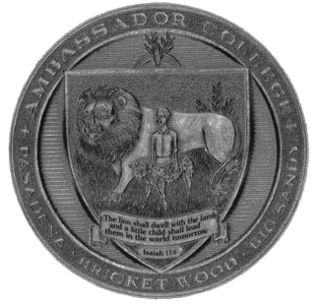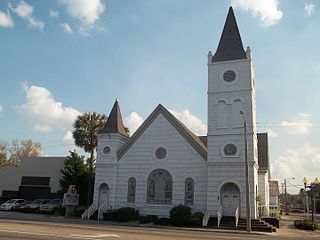
The Venice United Methodist Church of Venice, California, is a member of the California-Pacific Conference within the United Methodist Church. It serves the Venice and Marina del Rey communities within the UMC Cal-Pac Los Angeles District.

The Venice United Methodist Church of Venice, California, is a member of the California-Pacific Conference within the United Methodist Church. It serves the Venice and Marina del Rey communities within the UMC Cal-Pac Los Angeles District.
The Church was founded in 1913, as the First Methodist Church of Venice.
The campus is located on the southeast corner of Victoria Ave. and Lincoln Blvd., just one block north of Venice Blvd. The church is adjacent to the Venice Center for Peace with Justice and the Arts (VCPJA, the bright yellow building).
It is accessible by the Santa Monica #2 Big Blue Bus, and the Los Angeles MTA.
Venice United Methodist church celebrates worship on Sundays at 10:30 a.m. Services are between 60 and 75 minutes long. Following the service, everyone is invited to share a bit of refreshment during our “hospitality” time in the parlor, before they carry on with their day.
The worship contains the familiar and some unfamiliar: elements of music, prayer, Scripture reading, & prophetic witness.
On the first Sunday of each month the congregation celebrates communion. To this communion table, everyone is invited into the full life of the church.
Benedicta Ogbonnaya is now pastoring Venice United Methodist Church which meets on Sundays at 10:30AM. For more information, please visit: www.veniceumc.com.
not named
none
The congregation maintains an emergency food pantry and a people in crisis fund, for those who find themselves in momentary crisis.
The VUMC collaborates with other organizations and provides space, support, and encouragement for programs that nurture, guide, and provide safety for youth, feed the hungry, promote a living wage and universal health care, and promote non-violence and conflict transformation. They strive for peace with justice, responsible consumption and production practices, and ecological respect.
Some of these organizations are tenants of the VCPJA, the two story community center on the VUMC campus: Inside Out Community Arts and Easter Seals.

Unitarian Universalism (UU) is a liberal religion characterized by a "free and responsible search for truth and meaning". Unitarian Universalists assert no creed, but instead are unified by their shared search for spiritual growth, guided by a dynamic, "living tradition". Currently, these traditions are summarized by the Six Sources and Seven Principles of Unitarian Universalism, documents recognized by all congregations who choose to be a part of the Unitarian Universalist Association. These documents are 'living', meaning always open for revisiting and reworking. Unitarian Universalist (U.U.) congregations include many atheists, agnostics, and theists within their membership. There are U.U. churches, fellowships, congregations, and societies around the world. The roots of Unitarian Universalism lie in protestant liberal Christianity, specifically unitarianism and universalism. Unitarian Universalists state that from these traditions comes a deep regard for intellectual freedom and inclusive love. Congregations and members seek inspiration and derive insight from all major world religions.
The United Methodist Church (UMC) is a worldwide mainline Protestant denomination based in the United States, and a major part of Methodism. In the 19th century, its main predecessor, the Methodist Episcopal Church, was a leader in evangelicalism. The present denomination was founded in 1968 in Dallas, Texas, by union of the Methodist Church and the Evangelical United Brethren Church. The UMC traces its roots back to the revival movement of John and Charles Wesley in England, as well as the Great Awakening in the United States. As such, the church's theological orientation is decidedly Wesleyan. It embraces liturgical worship, holiness, and evangelical elements.

The United Church of Christ (UCC) is a mainline Protestant Christian denomination based in the United States, with historical and confessional roots in the Congregational, Calvinist, Lutheran, and Anabaptist traditions, and with approximately 4,794 churches and 773,539 members. The United Church of Christ is a historical continuation of the General Council of Congregational Christian churches founded under the influence of New England Pilgrims and Puritans. Moreover, it also subsumed the third largest Calvinist group in the country, the German Reformed. The Evangelical and Reformed Church and the General Council of the Congregational Christian Churches united in 1957 to form the UCC. These two denominations, which were themselves the result of earlier unions, had their roots in Congregational, Lutheran, Evangelical, and Reformed denominations. At the end of 2014, the UCC's 5,116 congregations claimed 979,239 members, primarily in the U.S. In 2015, Pew Research estimated that 0.4 percent, or 1 million adult adherents, of the U.S. population self-identify with the United Church of Christ.

The Metropolitan Community Church (MCC), also known as the Universal Fellowship of Metropolitan Community Churches (UFMCC), is an international LGBT-affirming mainline Protestant Christian denomination. There are 222 member congregations in 37 countries, and the fellowship has a specific outreach to lesbian, gay, bisexual, and transgender families and communities.
The National Council of the Churches of Christ in the USA, usually identified as the National Council of Churches (NCC), is the largest ecumenical body in the United States. NCC is an ecumenical partnership of 38 Christian faith groups in the United States. Its member communions include mainline Protestant, Eastern Orthodox, African-American, evangelical, and historic peace churches. Together, it encompasses more than 100,000 local congregations and 40 million adherents. It began as the Federal Council of Churches in 1908, and expanded through merger with several other ecumenical organizations to become the National Council of Churches in 1950.

Mother church or matrice is a term depicting the Christian Church as a mother in her functions of nourishing and protecting the believer. It may also refer to the primary church of a Christian denomination or diocese, i.e. a cathedral or a metropolitan church. For a particular individual, one's mother church is the church in which one received the sacrament of baptism. The term has specific meanings within different Christian traditions.

Ambassador College (1947—1997) was a four-year, liberal arts college run by the Worldwide Church of God. The college was established in 1947 in Pasadena, California, by radio evangelist Herbert W. Armstrong, leader of what was then the Radio Church of God, later renamed the Worldwide Church of God. The college was approved by the State of California to grant degrees.

Historic Filipinotown is a neighborhood in the city of Los Angeles. It is one of the six Asian Pacific Islander neighborhoods in the city.

The World Methodist Council (WMC), founded in 1881, is a consultative body and association of churches in the Methodist tradition. It comprises 80 member denominations in 138 countries which together represent an estimated 80 million people; this includes approximately 60 million committed members and a further 20 million adherents. It is the fifth-largest Christian communion after the Roman Catholic Church, Eastern Orthodox Church, World Communion of Reformed Churches, and Anglican Communion.

The black church is the faith and body of Christian congregations and denominations in the United States that minister predominantly to African Americans, as well as their collective traditions and members. The term "black church" can also refer to individual congregations.
Pico Boulevard is a major Los Angeles street that runs from the Pacific Ocean at Appian Way in Santa Monica to Central Avenue in Downtown Los Angeles, California, USA. It is named after Pío Pico, the last Mexican governor of Alta California.

The Cathedral of Hope (CoH), a member congregation of the United Church of Christ, is an historically and predominantly LGBT congregation located in the Oak Lawn area of Dallas, Texas, in the United States. The Dallas Cathedral of Hope is said to be the world's largest inclusive "liberal Christian church with a primary outreach to lesbian, gay, bisexual and transgender persons", with a membership of over 4,000 local members.

Mosaic is a multi-site megachurch based in Los Angeles, California and is currently led by Erwin McManus. The church in the past was affiliated with the Southern Baptist Convention, but today describes itself as non-denominational.

The General Commission on Christian Unity and Interreligious Concerns (GCCUIC) addresses the interreligious and ecumenical concerns of The United Methodist Church. The GCCUIC's office is located at The Interchurch Center in New York City. The Commission's President is Bishop Mary Ann Swenson and the General Secretary is Stephen J. Sidorak Jr. The Ecumenical Officer of the Council of Bishops is Bishop Sharon Zimmerman Rader and serves as the corporate ecumenical officer of The United Methodist Church, working in collaboration with GCCUIC.

The Central United Methodist Church is located in Downtown Detroit, Michigan. It was designated a Michigan State Historic Site in 1977 and listed on the National Register of Historic Places in 1982.

The United Church of Christ in the Philippines is a Christian denomination in the Philippines. Established in its present form in Malate, Manila, it resulted from the merger of the Evangelical Church of the Philippines, the Philippine Methodist Church, the Disciples of Christ, the United Evangelical Church and several independent congregations.
First Unitarian Church of Los Angeles is an independent congregation affiliated with the Unitarian Universalist Association of Congregations. Since its founding in 1877 the church has been a leader in social justice activism for the Unitarian Universalist faith, and for the city of Los Angeles. Its embrace of progressive causes and sometimes radical politics have earned it a reputation as both a place of controversy and a beacon of justice. Its affiliated organization, Urban Partners Los Angeles, provides numerous programs in the neighborhood around the church.
James Edwin Bacon Jr., known as Ed Bacon, is a retired priest in the Diocese of Los Angeles in the Episcopal Church in the United States of America and was the rector of All Saints Church, Pasadena, 1995–2016. Prior to coming to All Saints Church, Bacon served as Dean of the Cathedral of Saint Andrew in Jackson, Mississippi; Rector of St Mark’s in Dalton, Georgia; and Dean of Students and Campus Ministry at Mercer University. He also graduated from Candler School of Theology at Emory University. As an ordained priest, he was known for his active support of LGBT rights, peace, and interfaith causes. He retired to private life on May 1, 2016.

St. Paul's Cathedral is an Episcopal church located in the Bankers Hill district of the city of San Diego, California. It is the formal seat of the bishop of the Episcopal Diocese of San Diego. It traces its origins to the first Protestant church in San Diego, founded in Old Town in 1853, although the building itself was only completed in 1951.